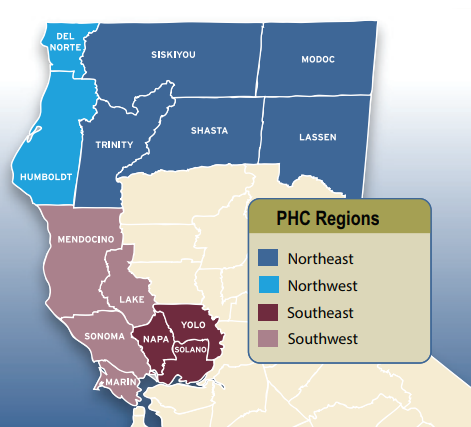Local Health Plans Work to Improve Access to Care
California’s successful implementation of the ACA gave millions of people access to health insurance. The rapid expansion of the Medi-Cal program – over 4 million since 2013 – meant health plans had to focus on creative solutions to account for longstanding provider shortages and meet regulatory and contractual access requirements. Access challenges exist across California, but are felt most acutely in rural areas, where obstacles faced by both health care providers and patients are vastly different from those in urban areas.
Medi-Cal Managed Care time/distance access requirements recognize 70% of California’s counties as small or rural because of their sparse population densities.
Local health plans in California’s rural and frontier geographies are enacting innovative strategies to ensure even the most remote communities have access to critical physician and specialty resources.
LHPC member Partnership HealthPlan of California (PHC) is successfully expanding access to and improving the quality of care for Medi-Cal managed care beneficiaries in rural northern California. PHC serves 570,000 members in a 14-county service area stretching from Del Norte and Modoc counties at the Oregon border to more densely populated Marin and Sonoma counties in the south. The plan’s largely rural geography illustrates how the health care needs and challenges of remote California residents are being met, and this model serves as an effective example for other plans grappling with similar issues.
Telehealth
The rural geography and sparse population of PHC’s service area means a doctor, specialist or hospital often is a great distance away, and many plan members have limited transportation options. PHC is addressing these obstacles to access in various ways, including through the advancement of technology and telehealth services, which uses telecommunications technologies and electronic information to support long-distance clinical health care and increased patient education. PHC currently has more than 20 telehealth sites and has administered more than 2,400 telehealth visits in 2016-17. While the impetus for PHC’s telehealth program was to create access for the northern-most rural counties, the services also have been utilized in more suburban counties, with telehealth sites in the more densely populated Sonoma and Solano counties.
Provider Recruitment & Building Workforce
To directly address concerns from clinic partners that there are not enough physicians to treat the growing number of plan members, PHC created the Provider Recruitment Program (PRP). This program supports recruitment of primary care providers (physicians, nurse practitioners and physician assistants) with a variety of incentives. Now in its fourth year, the PRP has supported 224 candidates (113 physicians, 111 advanced practitioners) who accepted offers to practice in the PHC coverage area. PHC also has dedicated a total of $8.3 million in PRP funding and is making additional efforts to encourage provider growth in its service area. On a broader scale, LHPC Board member and PHC CEO Liz Gibboney is one of 24 members on the new California Future Health Workforce Commission, which is working to develop a strategic plan for building the health workforce to meet California’s future health care needs.
Quality & Case Management
To attract and retain excellent clinicians, PHC offers several Quality Improvement Programs (QIP) with financial incentives and technical assistance to providers who serve its members and meet certain quality metrics. As part of this program, PHC issued more than $63 million in quality payments for fiscal year 2016-17 to participating providers. In addition, the PHC Care Coordination team proactively invites members and their providers to participate in programs that maximize positive health outcomes and satisfaction; educate providers about all case management programs with the latest protocols; and encourage providers to refer members to the appropriate programs.
Housing & Homelessness
Like so many other local health plans, PHC is addressing many of the health challenges that arise from housing insecurity and homelessness, including awarding $25 million to housing-related projects across its rural service area. In addition to funding, PHC took a hands-on approach by assisting with Shasta County’s 8th Annual Project Homeless Connect, where staff worked in the community to provide more than 400 adults facing homelessness with assistance and information about accessing many vital services, including a wide range of health-related needs like medical, optical and dental assistance; DMV identification cards; housing; employment; clothing; hygiene; and even veterinary services.
PHC’s efforts are just one of many examples of local health plans demonstrating their leadership in addressing the complex health care needs of their respective communities. Many of our plans’ programs serve as strong examples for statewide efforts and can inform policymakers as they seek to improve health care access and delivery of high quality health care for Californians.


